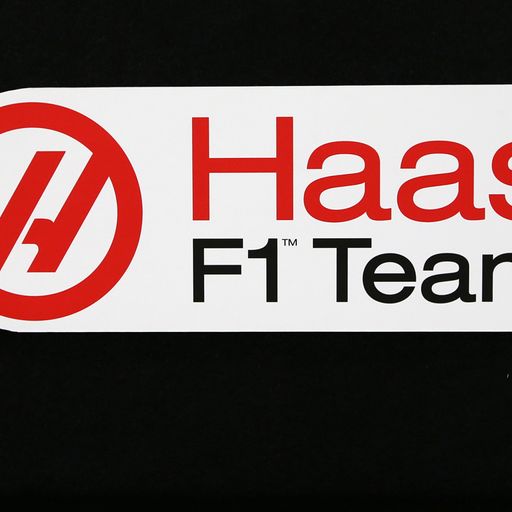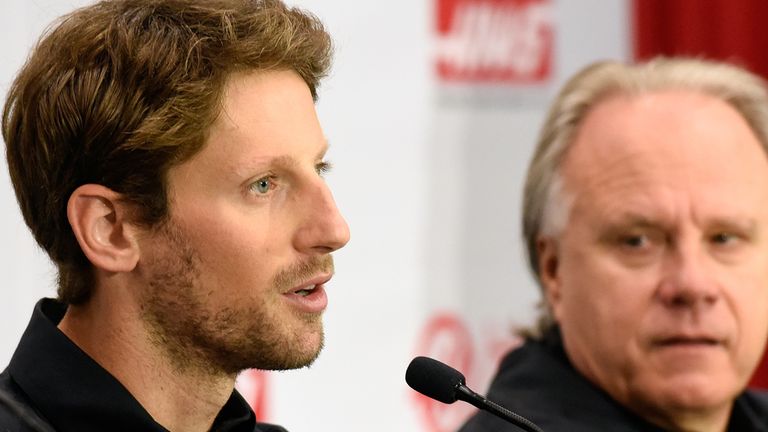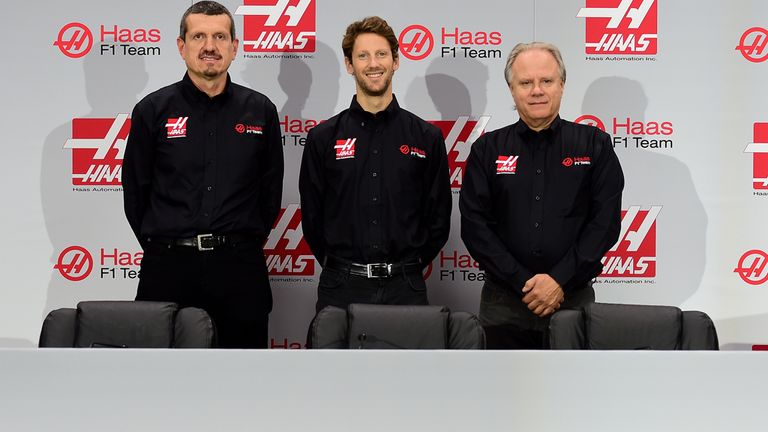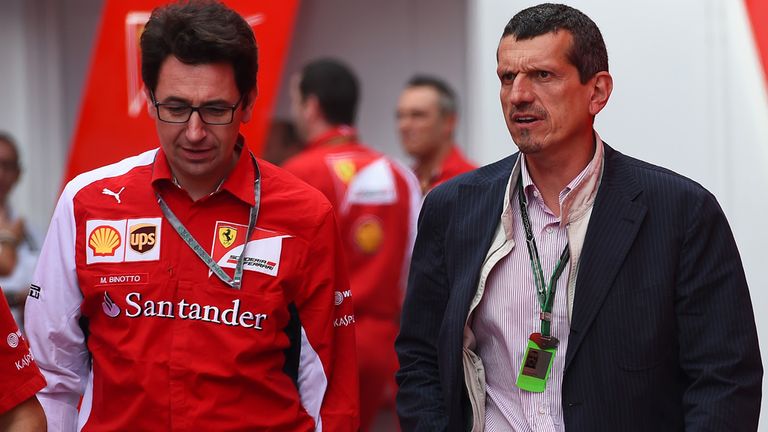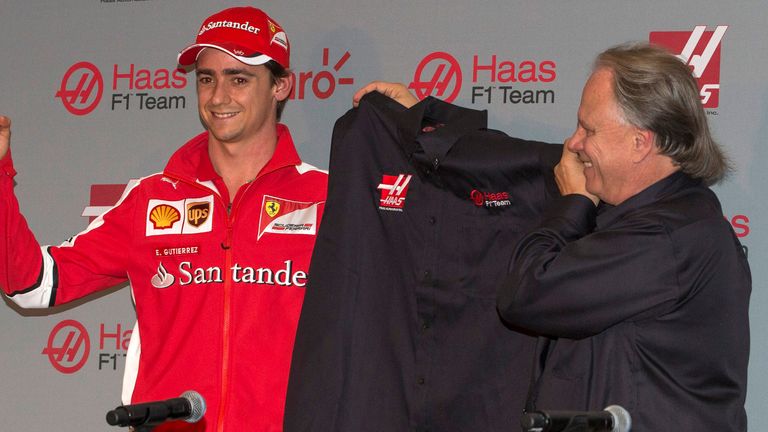Exclusive Q&A: Gene Haas on entering F1 and his team's 2016 chances
The Haas team boss talks to Sky Sports about whether F1 can make it big across the pond, his new team, the Ferrari connection, its drivers and whether a NASCAR star might ever make the jump to F1...
Friday 6 November 2015 16:42, UK
Besides starting a Formula 1 team to promote his Haas Automation machine tool company, Gene Haas is also hoping they can promote the sport in the United States.
F1 has always struggled Stateside, with the NFL naturally dominating the sports papers on the Monday after the US GP and the NASCAR race at Talladega also swamping the Austin race in terms of column inches.
But Gene Haas is convinced that F1 can succeed in America - and so can his American team in F1.
The 62-year-old spoke to Sky Sports about the sport making it big across the pond, plus his new team, the Ferrari connection, its drivers and whether a NASCAR star might ever make the jump to F1…
Do you think F1 can ever match NASCAR for popularity in this country?
GH: "I think there's always that potential. Formula 1 is a different venue from NASCAR, I think NASCAR is 'top of class' when it comes to circle-track racing in the United States. I think Formula 1 is top of its class when it comes to open-wheel road courses in the world. So I think they're somewhat different venues. But there's no reason why people can't enjoy both."
Perhaps there needs to be another Andretti-type superstar for F1 to gain popularity in the States?
GH: "I think of it more as North America: you have Canada, the United States and Mexico and now we're going to have races in all three countries. So if you look at it that way, there's a lot of car fans that really would be interested in Formula 1 and NASCAR."
Do you think your new team can successfully promote the sport in the US as well as itself, and the Haas brand?
GH: "When I started as a mechanic in F5000, I worked in the machine shop making magnesium wheels for race cars, so racing and making car parts was always what I did - and I'm still doing the same thing. To some degree, Americans like sports and Americans really support Americans that are in sports, especially when you watch the Olympics. So I think the American public will support an American team - just like they do all the time."
When did you become a fan of Formula 1?
GH: "My first taste of Formula 1 was back in 1975. I was a mechanic on a F5000 team at the Long Beach Grand Prix and then the next year was the first Formula 1 race that they held there - so the 5000 was kind of a precursor to trying the track out for Formula 1.
"I then went to the F1 race one or two years later. It was a practice and I was kind of enamoured when I saw these cars - because I was used to these big Chevy V8 engines - and then these, I guess at that time they were 12 cylinders, would come by and they just had these absolutely rip-roaring engines. And the cars: I remember one of the drivers spun out in a turn and I thought 'How's he going to get out of that?' He just blipped the throttle, smoked the wheels, did a 360 and…voom! I never saw that before. That was pretty cool!"
Your team are scheduled to be on the grid next season. What's been easier than expected and what's been more difficult than maybe you anticipated?
GH: "I think our first business model was to build the facility in Kannapolis [North Carolina, alongside his Stewart-Haas NASCAR team]. It was a large facility and we had this business model where we'd design and build cars in Kannapolis like every other race team does. It quickly became apparent that there were better ways to do it, so we purchased the facility in Banbury from the [Marussia] Formula 1 team and we developed some relationships with Dallara and Ferrari. So that did a 180 on what we were going to do in Kannapolis. We're doing what makes sense; if it makes sense to do it here or there, we're going to do whatever makes the most sense. We're not here to prove that we can do something; we're here to race cars."
Why did you choose Ferrari as your partner?
GH: "I thought Ferrari chose us! That was the bigger part of it - why did Ferrari want to partner with us? And I don't really know. I'm not 100 per cent sure what their ultimate motive was, but I think Bernie Ecclestone has always said that we need to get the bigger teams to help the smaller teams, so maybe that was their response: 'There's someone we can help.' I think they saw us as maybe a little more serious than some of the other start-ups and maybe they see some benefit with us too."
This is all to do with Appexdix 6 of the Sporting Regulations isn't it? It lists parts that teams must build themselves - and it's a list which was shortened in the last year or two…
GH: "But if you think about it, except for a few teams everybody has to buy their motors from somebody, most of them buy their transmission from someone, they all buy their brakes from somebody, they all buy their tyres from another supplier…
"As far as customer cars, there's a fine line to say 'Are all these teams making every single bit of their cars?' No, I'd say almost every single team, even the bigger ones, end up buying some of their parts from other suppliers."
You mentioned customer cars: some people are saying that your approach puts F1 on a slippery slope towards customer cars…
GH: "They've been talking about customer cars ever since Formula 1 started. Wasn't it back in the '60s and '70s that everybody drove a Ford Cosworth engine inside of a Lola chassis? Were they customer cars? I guess they were, but that's what they were doing. I don't think it's as black and white as you'd think."
It sounds like it's the way forward for smaller teams though - Manor are taking the same route…
GH: "That's true. They made a deal with Mercedes for the engine and Williams for the suspension. You can't develop a transmission right out of the box, it's impossible. It would take years and thousands of man hours to develop that, so we have to purchase these things."
As a consequence, you've been called Ferrari's 'B' team. But doesn't that by logic limit expectations - that you won't be able to beat Ferrari?
GH: "Being a Ferrari 'B' team, I don't think there's any negativity in that at all because that's obviously a sign of excellence, that we're going to have some of the best equipment out there to compete with these teams. I don't think we could beat them at that. Can we beat them at racing? I don't know. I have to be honest with you, I don't think Ferrari has held anything back; they've opened the doors and said 'Here's what we do, here's how we do it. I guess if you can take our nuts and bolts and beat us then maybe we can learn something too'."
So how do you reconcile 'B' status with the marketing aspect - that idea that 'success sells' or whatever?
GH: "A substantial amount of the engine, transmission, suspension will come from Ferrari. But there's still a lot left that we have to do. We're doing our own CFD computer analysis on our own, we're also working with Dallara on a lot of the analysis of the body structure, but we're building those parts ourselves. And I don't know why we can't be as good as anybody else at that. We have some very bright people working at Kannapolis on the analysis of the chassis.
"I think our chassis is going to be substantially different in construction from the Ferrari one, because we're just doing it separately. We think our chassis in some ways will be better than a Ferrari chassis because we're using some more…I won't say state of the art but we're taking a different approach than Ferrari is and we think it's probably a better design. The Ferrari is more conventional, they're going to stay with what they've been doing for a number of years. I think there could be some big differences there."
Turning to the drivers, did you consider it a coup to land Romain Grosjean? Because while he's seen as an up-and-coming driver, he now has experience as well…
GH: "I think you analyse that exactly the way I would. We were talking to a number of drivers; some of them wanted to see what we were doing because they were interested. We did make an offer to one that was declined (reportedly Nico Hulkenberg) which I think is reasonable because who would want to go with a start-up team? We were talking to Romain and other Formula 1 drivers and Romain took an interest in it.
"He came and visited our facility and saw what we were doing, saw that we have a successful NASCAR team, and it was up to him to make that decision. For whatever reasons he decided to join us. I think he takes a risk because we are a start-up team and start-up teams have always historically have had these problems, so I think we did better than we expected with Grosjean. But hopefully we'll do better than people expect to when we start racing."
What about an American driver somewhere down the line? There was talk last year about Danica Patrick…
GH: "I narrowed my drivers down to 20! I thought that was kind of funny but everybody took it serious, that it was down to 20 drivers. In a perfect world I'm sure that if Danica had the right sponsors, she'd probably be a great Formula 1 choice just because of the insane publicity that would come with that. If you were a sponsor and wanted to hit one out of the ballpark in terms of the number of people that would want to watch this, then it would be phenomenal. But on the other hand we want to win races, so you have to kind of balance that.
"You can't take an inexperienced driver, put them in a Formula 1 car and expect instant results, we knew that. That's why Romain Grosjean fit the bill and that worked for us. The second driver, I made no qualms about, was going to be a Ferrari reserve driver (to no-one's surprise, Esteban Gutierrez was eventually announced at the Mexican GP) because a deal we have with Ferrari is to work with some of their drivers. They have experience in the Ferrari chassis and simulator, so that's the prospect there and they have two good reserve drivers."
So if one of the top NASCAR guys was banging on your door and phoning you 50 times a day saying 'Gene, Gene I really want to do F1' would you say 'Sorry but we're looking for experience'?
GH: "If it was a young Tony Stewart, sure. I'd put a young Tony Stewart in there; I'd put a young Jeff Gordon in there too, because those guys have talent I think is equal to a Formula 1 driver. But in Formula 1, that critical age of being successful is much shorter than NASCAR. I'd love to have an American driver - an American driver that was capable with that kind of proven talent would be a home run."
Straight from NASCAR to F1?
GH: "It would take a Tony Stewart talent. You could put Tony in any kind of car and he can figure that car out in a few laps."
What are you expectations for next season? Romain's already said he wants to score points from the get-go.
GH: "I think that's an accurate assessment, our main goal would be to score some points. Below that, our goals are just to simply show up at the race tracks prepared, have cars that are competitive and finish races. That's our primary goal; our secondary goal would be to score some points. I think that's going to be possible, depending on who we're racing next year.
"There's so much drama going on with who's going to show up and who's going to go out of business that maybe some of the people will 'pass in the pits' and we can't even race them. It's not for me to say who we're racing but there's a lot of good competition out there. But when I hear what's going on, I get a little bit worried myself, like 'Wow, there's a lot of major changes'. But I have to admit that it was the same stuff a year ago and two years ago; it seems like there's always this drama, but come the next year all the teams seem to show up."
That was happening at last year's US GP wasn't it…
GH: "Yeah, that we're maybe going to lose three teams. Caterham didn't make it but that was the one I thought was going to show up."
So that's next season. And in the longer term you're 'in it to win it' as they say?
GH: "We're using the same model as we did NASCAR, where you just keep showing up. We had to show up in NASCAR for, I think, seven or eight years before we even won a race. And then we started to win races and we won a couple of championships along the way. So that's our plan."
Watch the Brazilian GP live on Sky Sports F1. Race-show coverage begins at 2.30pm on Sunday with lights out at 4pm. Watch all three days of the Brazilian GP for £10.99 on NOW TV. No contract.

